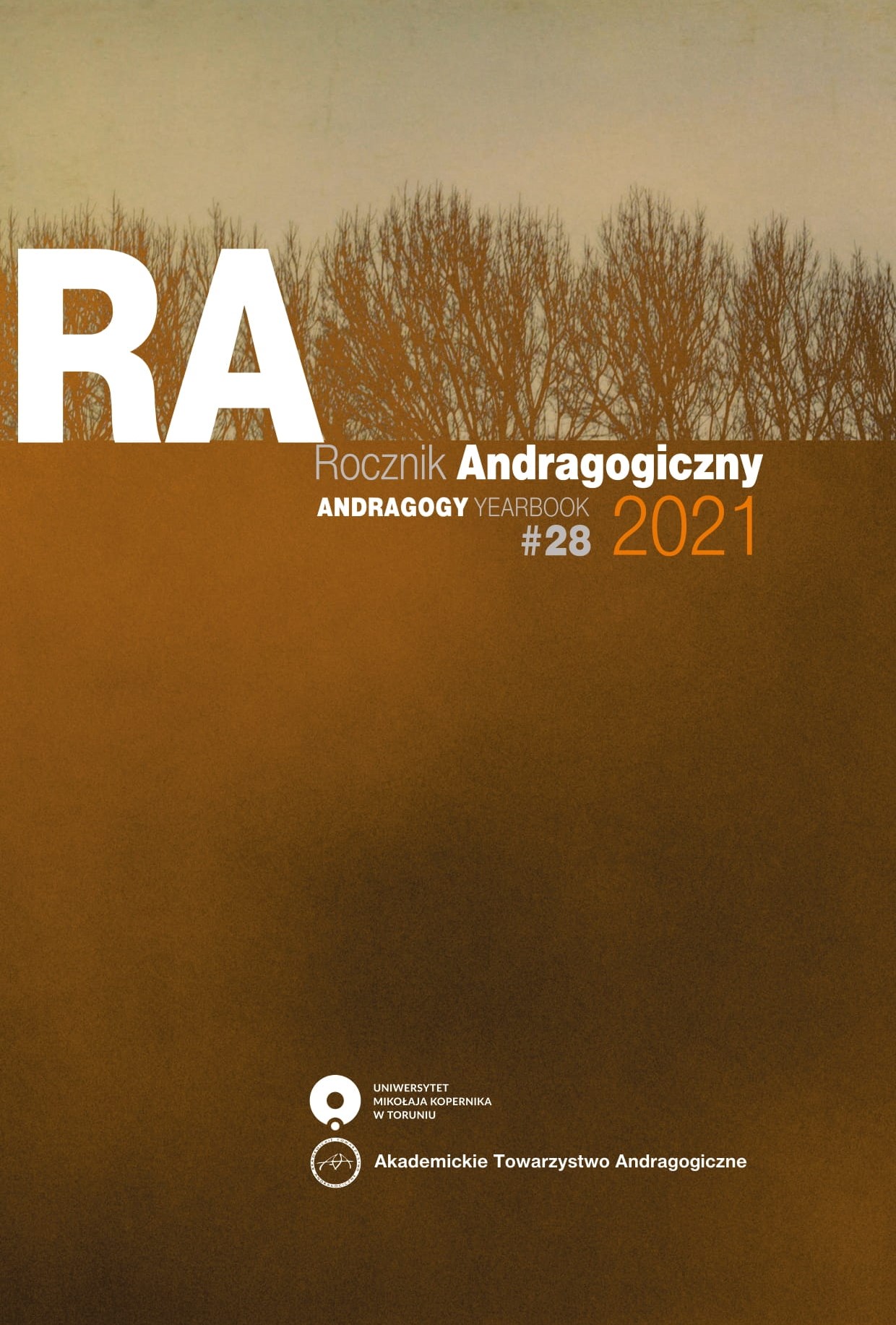Teacher educators’ macro- and microadaptation as a reaction to the complexity of teaching situation
DOI:
https://doi.org/10.12775/RA.2021.004Keywords
adaptability, teacher educators, teaching process, variabilityAbstract
Due to the great variability of the educational reality, teachers are required to constantly modify their teaching practice to suit the needs and possibilities of learners, as well as in case of unexpected events. Adaptative behaviour provides the teacher with specific training preparing them for an extremely difficult situation, such as teaching in the era of a pandemic. In the paper, the theoretical considerations are enriched by research conducted in the form of interviews among 14 teacher educators. Their statements allow the exploration of two types
of teacher’s behaviour: macro- and microadaptive
References
Alheit P. (2011), Podejście biograficzne do całożyciowego uczenia się, „Teraźniejszość – Człowiek – Edukacja”, nr 3(55), s. 7–21.
Bachari E.E., Abelwahed E.H., Adnani M.E. (2012), An adaptive teaching strategy model in e-learning using learners’ preference: LearnFit framework, „International Journal of Web Science”, nr 1(3), s. 257–274.
Beltramo J.L. (2017), Developing adaptive teaching practices through participation in cogenerative dialogues, „Teaching and Teacher Education”, nr 63, s. 326–337.
Bennis W.G., Nanus B. (1986), Leaders: The Strategies for Taking Charge, Harper & Row, New York.
Bereiter C., Scardamalia M. (1993), Surpassing ourselves. An inquiry into the nature and implications of expertise, Open Court Publishing, Chicago.
Bond L., Smith T., Baker W., Hattie J.A. (2000), The Certification System of the National Board for Professional Teaching Standards. A Construct and Consequential Validity Study, The University of North Carolina, Center for Educational Research and Evaluation, Greensboro.
Collie R.J., Martin A.J. (2017), Teachers’ sense of adaptability: Examining links with perceived autonomy support, teachers’ psychological functioning, and students’ numeracy achievement, „Learning and Individual Differences”, nr 55, s. 29–39.
European Commission (2013), Supporting teacher educators for better learning outcomes, European Commission, Brussel.
Flick U. (2011), Jakość w badaniach jakościowych, PWN, Warszawa.
Gibbs G. (2011), Analizowanie danych jakościowych, PWN, Warszawa.
Gołębniak B.D. (1998), Zmiany edukacji nauczycieli. Wiedza – biegłość – refleksyjność, Wydawnictwo EDYTOR, Toruń–Poznań.
Hammer D., Goldberg F., Fargason S. (2012), Responsive teaching and the beginnings of energy in a third-grade classroom, „Review of Science, Mathematics and ICT Education”, nr 6(1), s. 51–72.
Hammerness K., Darling-Hammond L., Bransford J., Berliner D., Cochran-Smith M., McDonald M. (2005), How teachers learn and develop, [w:] Darling-Hammond L. (red.), Preparing teachers for a changing world: What teachers should learn and be able to do, Jossey Bass, San Francisco, s. 358–389.
Howell P.B. (2012), Conceptualizing developmentally responsive teaching in early field experiences, „Middle Grades Research Journal”, nr 7(4), s. 43–55.
Kosiba G., Madejski E. (2014), Postawy nauczycieli wobec swej roli zawodowej w świetle wybranych koncepcji teoretycznych, „Forum Oświatowe”, nr 2(52), s. 101–112.
Kruszewski K. (2012), Nauczyciel jako twórca programu, [w:] Kruszewski K. (red.), Sztuka nauczania. Czynności nauczyciela, PWN, Warszawa.
Loughland T., Alonzo D. (2019), Teacher Adaptive Practices: A Key Factor in Teachers’ Implementation of Assessment for Learning, „Australian Journal of Teacher Education”, nr 44(7), s. 18–30.
Mevarech Z.R. (1995), Teachers’ paths on the way to and from the professional development forum, [w:] T.R. Guskey, M. Huberman (red.), Professional development in education: new paradigms and practices, Teachers College Press, New York.
Niemierko B. (2007), Kształcenie szkolne. Podręcznik skutecznej dydaktyki, Wydawnictwa Akademickie i Profesjonalne, Warszawa.
Ramírez R., Wilkinson A. (2016), Strategic reframing: The Oxford scenario planning approach, Oxford University Press, Oxford.
Sardar Z. (2010), Welcome to postnormal times, „Futures”, nr 42, s. 435–444.
Saukko P. (2000), Between voice and discourse: Quilting interviews on anorexia, „Qualitative Inquiry”, nr 6, s. 299–317.
Seale C. (2000), The Quality of Qualitative Research, SAGE, London–New Delhi–Thousand Oaks.
Schwartz D., Bransford J., Sears D. (2005), Efficiency and innovation in transfer, [w:] J. Mestre (red.), Transfer of learning. Research and perspectives, Information Age Publishing, Greenwich.
Solarczyk-Szwec H. (2015), Cztery ćwiartki biograficznego uczenia się, „Rocznik Andragogiczny”, nr 22, s. 119–133.
Szplit A. (2019), Od nowicjusza do eksperta. Rozwój ekspertywności nauczycieli nauczycieli języków obcych, Wydawnictwo Uniwersytetu Jana Kochanowskiego, Kielce.
Vaughn M., Parsons S.A. (2013), Adaptive teachers as innovators: Instructional adaptations opening spaces for enhanced literacy learning, „Language Arts”, nr 91(2), s. 81–93.
Zawadzka E. (2004), Nauczyciel języków obcych w dobie przemian, Oficyna Wydawnicza Impuls, Kraków.
Netografia:
Cascio J. (2020), Facing the Age of Chaos, https://medium.com/@cascio/facing-the-age-of-chaos-b00687b1f51d [otwarty: 20.03.2021].
Crawford V.M., Schlager M., Toyama Y., Riel M., Vahey P. (2005), Characterizing
Adaptive Expertise in Science Teaching, https://www.sri.com/sites/default/files/publications/imports/MAESTRoAdEx.pdf [otwarty: 20.07.2017].
Villegas-Reimers E. (2003), Teacher professional development: an international review of the literature, UNESCO, International Institute for Educational Planning, www.unesco.org/iiep [otwarty: 12.06.2017]
Downloads
Published
How to Cite
Issue
Section
License
Copyright (c) 2021 Rocznik Andragogiczny

This work is licensed under a Creative Commons Attribution-NoDerivatives 4.0 International License.
Stats
Number of views and downloads: 738
Number of citations: 0



